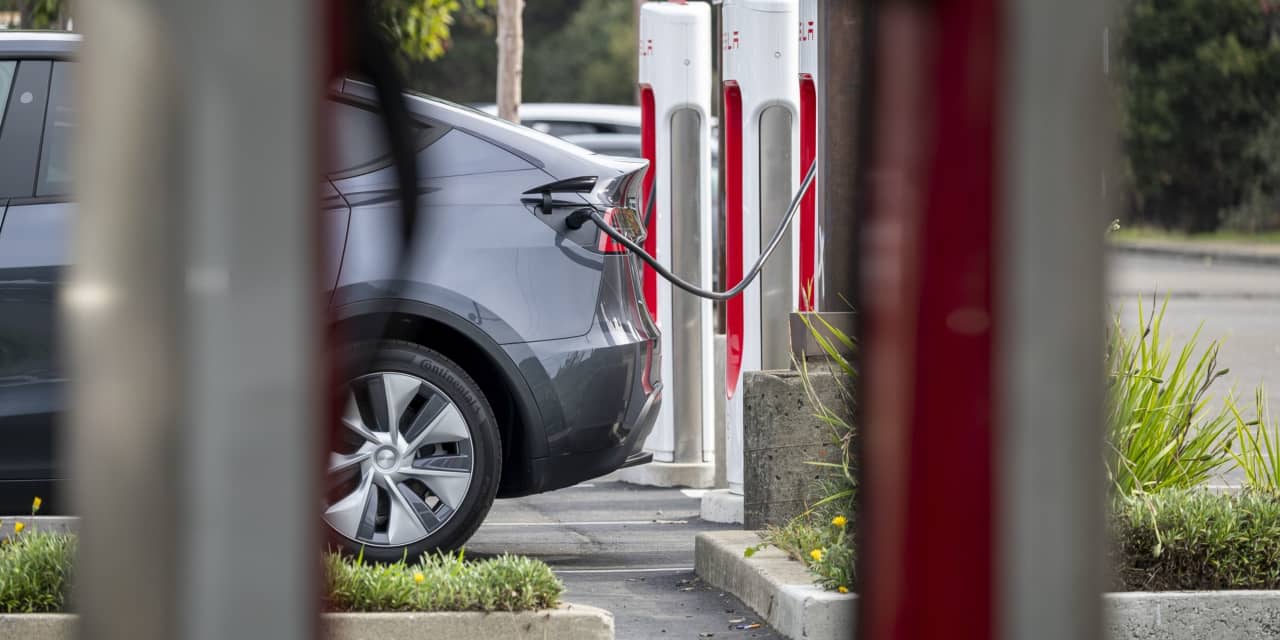Coke or Pepsi.
United Parcel Service
or
FedEx.
Marvel or D.C. There have been many epic battles between the No. 1 and 2 players in an industry. The EV industry now has its own one-two punch:
Tesla
and
BYD.
As the EV competition unfolds, investors will have to decide which is the better investment.
Bernstein analysts led by Toni Sacconaghi clearly favor the Chinese upstart, comparing the two in a Monday report. “Tesla and BYD…are now comparable in size across volumes, revenues, and profit dollars, but BYD is growing significantly faster,” wrote Sacconaghi.
BYD sold some 822,000 passenger vehicles in the third quarter including roughly 432,000 battery electric vehicles and 390,000 plug-in hybrid vehicles. Tesla sold about 435,000 BEVs.
BYD unit sales are up roughly 70% year to date. Tesla’s are up about sales are up about 46%. What’s more, BYD should sell more BEVs than Tesla in the fourth quarter. It will be the first time Tesla isn’t No. 1 since it popularized battery-powered cars.
As for profits, Tesla generated a third-quarter operating profit of about $1.8 billion. BYD generated about $1.7 billion. For the coming year, Bernstein projects Tesla will reach $114 billion in sales and $8.7 billion in operating profit. The broker’s numbers for BYD are $112 billion and $7.1 billion, respectively.
All that has Sacconaghi asking, “How is one worth $750 billion and the other $90 billion.” Those are the recent respective market capitalizations of Tesla and BYD. Telsa’s market cap values it at about 60 times estimated 2024 earnings. BYD’s values it at about 15 times.
“We struggle to bridge the $600 billion-plus valuation gap that exists between Tesla and BYD,” adds Sacconaghi. Bernstein rates Tesla stock the equivalent of Sell and BYD stock the equivalent of Buy.
Bernstein’s target price for Tesla stock is $150 a share. Tesla stock recently traded for about $234 a share. The broker’s target for BYD’s U.S.-listed American depositary receipts, or ADRs, that trade under the stock symbol “BYDDY,” is about $100 apiece. They recently traded for about $57 per ADR.
Bernstein clearly prefers BYD. Wedbush analyst Dan Ives doesn’t cover BYD, but rates Tesla shares Buy and has a $310 price target for the stock.
“We view Tesla still as the clear leader globally for 2023 and to cherry-pick 4Q for BYD does not tell the whole story,” Ives tells Barron’s. “Bears that have missed the historical Jalen Hurts-like run in Tesla’s stock for years will continue to nitpick with Musk & Co. still at the top of the mountain along with BYD a clear No. 2 competitor.”
In other words, don’t doubt Tesla. It has strategies to grow far in the future. While Tesla and BYD have similar sales bases in 2024, Tesla is selling fewer vehicles but its average selling price is much higher. Musk’s car company is developing a smaller, lower-priced EV that can accelerate sales growth in the future, helping the company keep its leadership position.
The smaller Tesla is typically called the Model 2 by investors. It is slated to arrive in 2024 or 2025. The sooner the better.
The biggest reason for the Tesla-BYD valuation gap might not have anything to do with financial fundamentals or car models though. It may come down to geography.
Tesla derives about 25% of its sales from China. BYD generates closer to 80% of sales from China. Market concentration is something that investors have to factor in when valuing a stock.
Chinese investors hold most BYD stock and they view BYD primarily as an automotive investment. These days, Chinese EV investors are worried about more competition, which is driving down prices and profitability, writes Sacconaghi.
Tesla’s mainly U.S. investors care about competition. But they are also focused on artificial intelligence and how AI can help Tesla develop better self-driving car features faster.
Self-driving technology can drive software sales at Tesla and could eventually enable robotaxi business models that might have Tesla operating an
Uber Technologies
-like fleet of driverless cars earning taxi-like revenues without having to pay drivers.
In the end, both analysts at Bernstein and Wedbush could be right. Tesla could be worth more, like Ives believes. And BYD can be the better performer, closing the valuation gap as investors’ views converge.
Coca-Cola
(KO) stock, after all, is valued at some $250 billion.
PepsiCo
(PEP) shares are valued at some $230 billion. That gap is much smaller than the Tesla-BYD chasm.
Write to Al Root at [email protected]
Read the full article here




